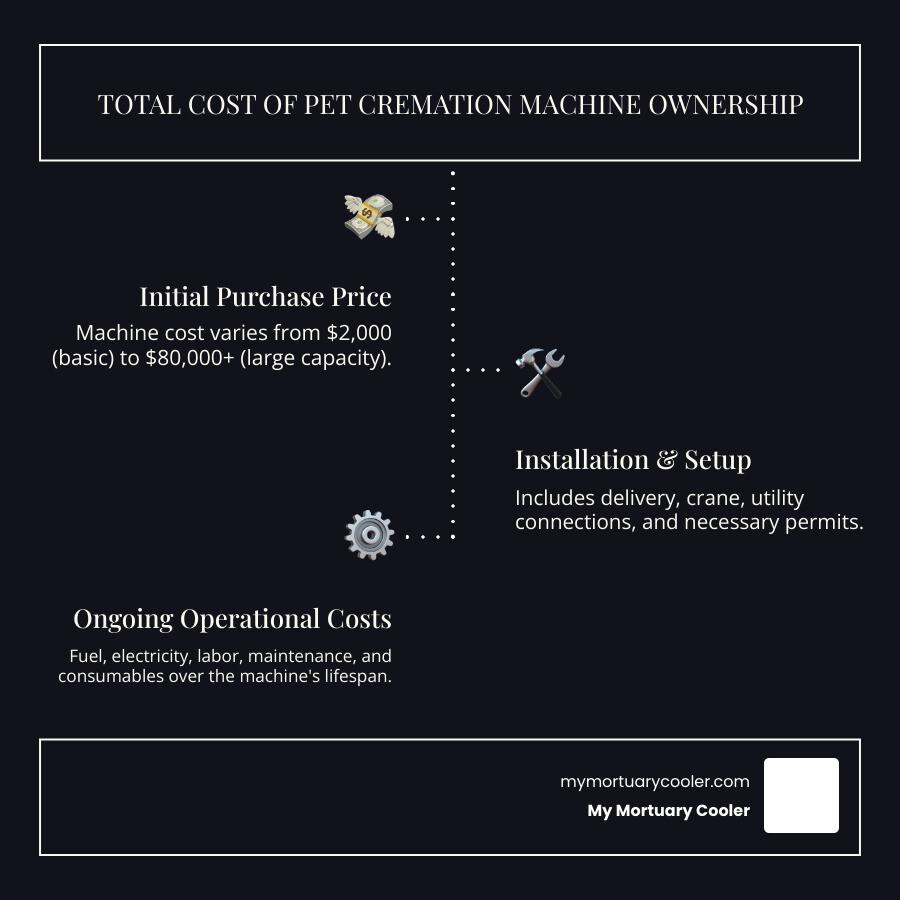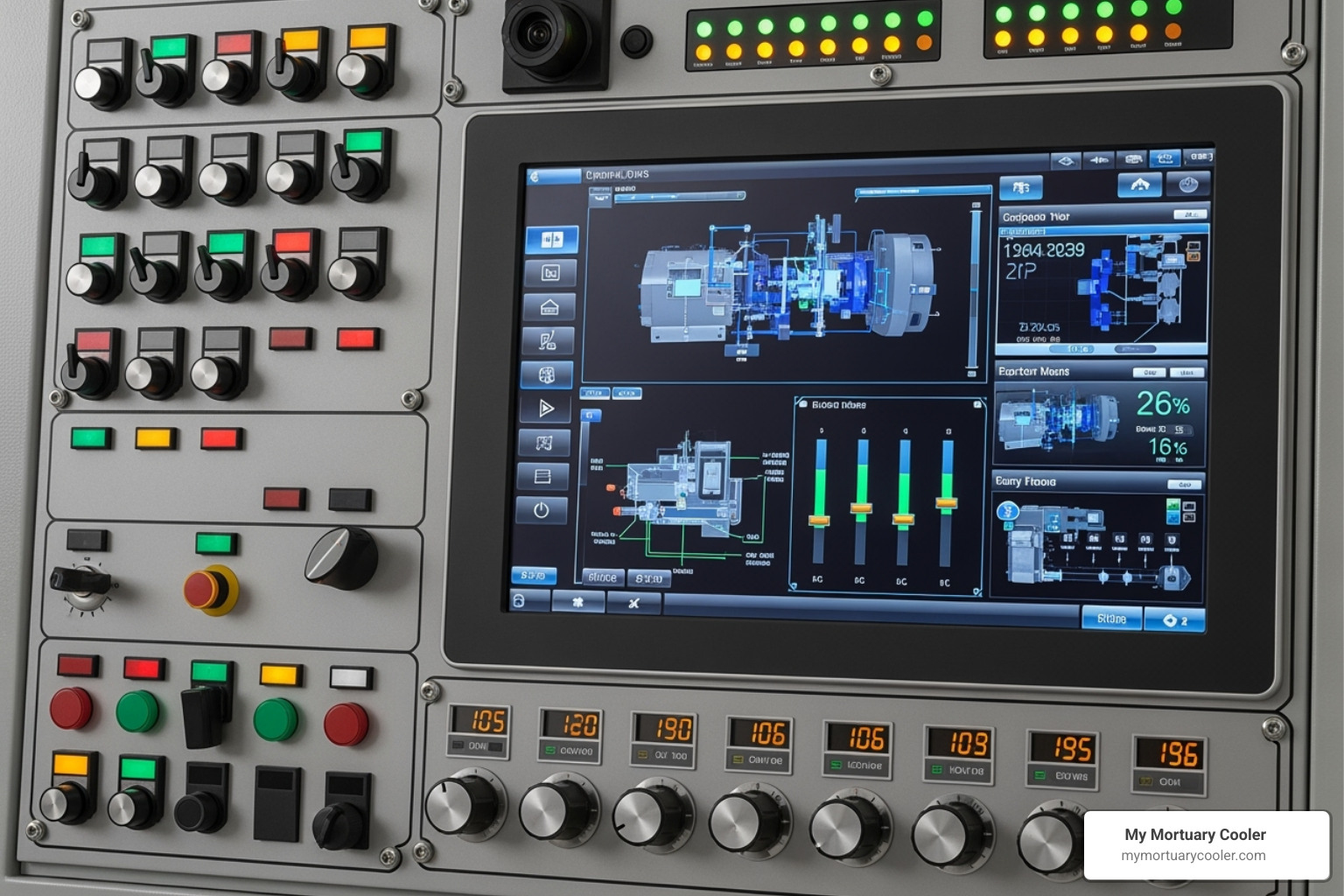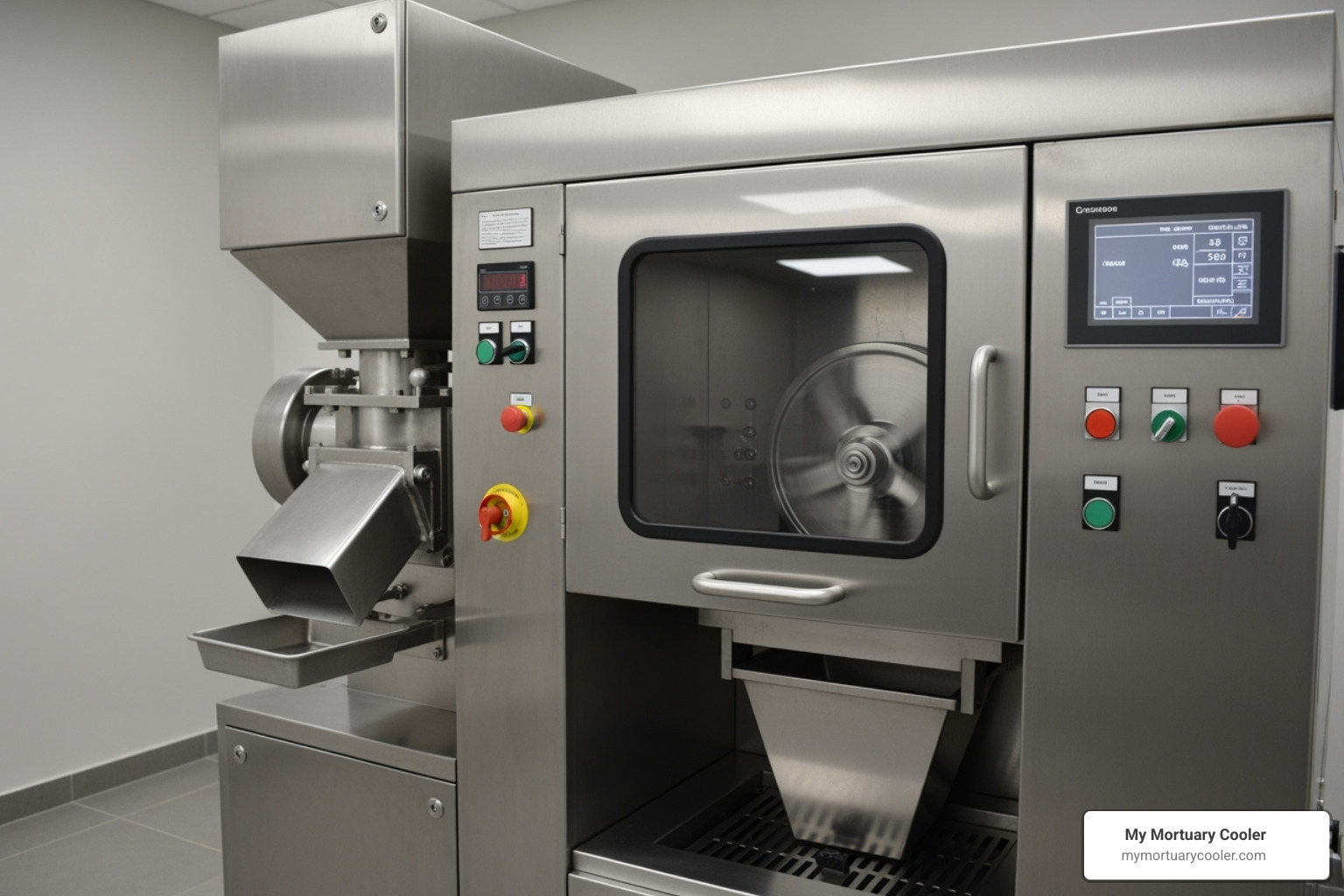Unpacking the Costs: Your Guide to Pet Cremation Machine Investment
Considering a pet cremation machine cost requires understanding the full investment. Prices for professional equipment vary widely. Here's a quick overview of what you can expect:
- Entry-Level (basic, small capacity): Roughly $2,000 - $5,000
- Mid-Range (professional, moderate capacity): Around $21,700 for professional models
- High-End (advanced, large capacity): $35,000 and up
The pet care industry is booming, with more owners seeking respectful ways to say goodbye to their companions. This drives demand for professional pet cremation services.
For veterinary clinics, animal shelters, or new businesses, a pet cremation machine can be a solid business opportunity. It's a vital service and a new revenue stream. As one customer put it, "It wasn't fancy, but it allowed me to launch my pet cremation business without taking out a second mortgage."
However, the purchase is more than the upfront price. You must consider the total cost of ownership, including installation and long-term operational expenses, to make a smart investment.

Understanding the Initial Investment: Pet Cremation Machine Price Ranges
Exploring the pet cremation machine cost is the first step, and this figure varies widely based on capacity, features, and technology. Whether you need a small unit for a vet clinic or a large, industrial-grade machine for a dedicated crematorium, there's a spectrum of choices.
Generally, prices for pet cremation machines can start as low as $2,000 for basic models and exceed $180,000 for advanced, large-scale systems. This range highlights the importance of understanding your specific needs before purchasing. While wholesale pricing from international suppliers can seem appealing, remember to factor in shipping, import duties, and modifications for local compliance.
We always recommend looking beyond the sticker price when you're considering any Cremation Furnace for Sale. It's about finding the right fit for your unique situation.
Here's a general overview of what you can expect across different capacities:
| Capacity Category | Typical Price Range | Load Capacity (lbs/kg) | Daily Throughput (approx.) | Ideal User |
|---|---|---|---|---|
| Small | $2,000 - $25,000 | 100-200 lbs (45-90 kg) | 1-7 cremations | Small vet clinics, individual users |
| Medium | $25,000 - $80,000 | 200-750 lbs (90-340 kg) | 15-30 cremations | Medium vet facilities, pet funeral homes |
| Large | $80,000+ | 750-2000+ lbs (340-900+ kg) | 60+ cremations | Large dedicated crematoriums, equine facilities |
Breaking Down the Pet Cremation Machine Cost by Capacity
Let's dig deeper into these categories for a clearer picture of the pet cremation machine cost based on size.
If you're running a vet clinic or starting in pet cremation, small capacity machines are often a perfect fit, typically falling into the $2,000 to $25,000 price range. They're designed for smaller companions like birds, cats, and dogs, handling loads between 100-200 lbs. A typical small model, for example, can perform up to 7 pet cremations in a single day, offering a cost-effective way to enter the market.
Moving up, medium capacity machines are generally priced between $25,000 and $80,000. These robust units accommodate larger animals, with load sizes from 200-750 lbs. Medium-capacity models are optimized to complete around 15 to 30 pet cremations per day. These are well-suited for growing pet funeral services or medium-sized veterinary facilities.
For high-volume operations, large capacity machines are the focus. These start at $80,000 and can climb into the hundreds of thousands. These powerful units handle substantial loads of 750-2000+ lbs, including specialized Horse Cremation Equipment. A large-capacity model, for instance, can be designed to complete 60 or more pet cremations a day. These machines are built for heavy-duty use in large, dedicated pet crematoriums.
Technology Types and Their Costs
The technology within a pet cremation machine also significantly influences its pet cremation machine cost. While the core function is to reduce remains to ash, the method varies.
Single chamber units are often the most straightforward and can be found in the entry to mid-level price ranges. They perform one cremation at a time, making them simpler to operate. For businesses needing to perform multiple private cremations simultaneously without co-mingling remains, multi-chamber units are a game-changer, though they come with a higher pet cremation machine cost due to their complexity.
Many advanced systems boast Hot Hearth technology. This technology heats the main chamber from above and below, creating 360-degree heat penetration for more efficient cremations, shorter cycles, and better results. It's typically found in mid-to-high-end machines, contributing to their price but offering clear operational benefits. Most modern pet crematories also operate as retort cremators, where the pet's body is placed in a chamber and subjected to intense, controlled heat.
When it comes to power, you'll find electric vs. gas-fired units. Most commercial pet crematories are gas-fired (natural gas or propane) because they reach high temperatures quickly. While some smaller units might be electric, gas-fired options usually offer faster cremation times and higher capacities. Your choice of fuel impacts both the machine cost and ongoing operational expenses.
Finally, smokeless technology is essential. Environmental regulations demand clean, smokeless operations. Reputable manufacturers integrate secondary combustion chambers and control systems to ensure clean emissions. Machines advertised as "smokeless" or "odorless" have a higher price but are crucial for regulatory compliance and community relations.
Key Factors That Influence the Pet Cremation Machine Cost
Beyond size, several other factors affect the pet cremation machine cost. Understanding these helps you see the value beyond the price tag.

Consider the manufacturing quality and materials. Machines built with high-quality steel and durable parts, like the refractory lining, last longer and need fewer repairs. Better materials increase the initial cost but save money long-term. The level of technology and automation also plays a big role. Simple machines may have manual controls, while advanced ones offer digital touchscreens, pre-set cycles, and remote monitoring. These features add to the price. Finally, brand reputation matters. Well-known manufacturers with a history of reliable equipment and great customer support often charge more. This premium often buys peace of mind. Any customization for your specific needs will also increase the final price.
New vs. Used: A Major Pet Cremation Machine Cost Factor
Deciding between a new or used pet cremation machine is a major financial choice.
A used machine has a lower upfront pet cremation machine cost, which is tempting for new or budget-conscious businesses. However, used equipment carries risks. You might get a machine with significant wear and tear, older technology, or failing parts. It's tough to know its full maintenance history.
That's why a careful inspection by an expert is crucial before buying used. A great deal can become expensive with costs for refurbishment, replacement parts, or upgrades to meet current safety standards. Plus, new machines come with manufacturer warranties for protection. Used machines rarely offer such warranties, leaving you to cover unexpected repair bills. For more helpful tips, check out our guide: 5 Dos and Don'ts for Buying Used Animal Cremation Equipment.
Manufacturer, Features, and Advanced Technology
The manufacturer, its features, and technology greatly influence the pet cremation machine cost.
A manufacturer's reputation for quality, reliability, and excellent after-sales support is incredibly valuable. This includes available spare parts and quick technical help. Researching customer reviews and a manufacturer's history is a smart step before such a large purchase.
Modern machines come with different levels of automated controls, from simple programmed cycles to systems that automatically adjust based on weight. These features make operation easier, ensure consistent results, and can save on labor. Many newer models also have advanced fuel efficiency features. Features like pulse-firing burners, efficient insulation, and "Hot Hearth" technology can significantly reduce fuel costs, with some systems being up to 40% more fuel-efficient! Some manufacturers offer a modular design for expansion, allowing you to add chambers later as your business grows. And, of course, top-notch safety features are a must. Look for automatic burner shut-off, easy-to-use loading designs, and advanced monitoring systems to keep operators safe.
To help you compare different options, read The Complete Guide to Comparing Pet Cremation Equipment.
Regulatory Compliance and Additional Expenses
Beyond the purchase price, other costs tied to regulations and setup can significantly impact the total pet cremation machine cost.
Installation and setup are rarely included in the sticker price. Delivery can cost $5,000-$15,000, and a crane operator to place the equipment might add $2,000-$5,000. Connecting to utilities is also a big expense: gas lines ($5,000-$15,000), electrical work ($3,000-$10,000), and a proper ventilation/chimney system ($10,000-$25,000). Don't forget foundation work ($5,000-$20,000) if you need a special concrete pad.
Shipping costs add up, especially for machines from another country. Ocean freight alone might be $5,000-$10,000, plus duties and taxes. You'll also need to budget for staff training to ensure safe and efficient operation. While some manufacturers offer basic training, detailed sessions might cost extra.
Permitting fees are another variable. Costs change depending on your city, county, and state. For example, EPA permits can be $5,000-$20,000, zoning approvals $2,000-$15,000, building permits $1,000-$5,000, and environmental impact studies $5,000-$25,000. We suggest checking with your local government first. You can also look at general information on The latest regulations on emissions.
In the UK, machines need DEFRA approval and must follow EU Animal By-Products Regulations. While a UK rule, it shows the importance of meeting your local environmental and disposal rules. Machines built to such high standards often have a higher price but provide compliance peace of mind.
Lastly, don't forget ancillary equipment. These tools make your operation smooth, including hydraulic lift tables, ash removal tools, and cremulator ash processing machines.

These extra costs can add $130,000 to $330,000 to the system's base price, showing the total investment goes far beyond the initial pet cremation machine cost. For a complete breakdown, check out The Real Cost of Cremation Machines Revealed.
Beyond the Sticker Price: Ongoing Operational Costs
Once your pet cremation machine is operational, the initial pet cremation machine cost becomes one part of the total cost of ownership. Like a car, ongoing expenses such as fuel and maintenance are significant. Over a lifespan of 15 to 30 years for well-cared-for equipment, daily operational expenses determine the machine's overall cost-effectiveness. It's smart to compare the upfront price with these long-term running costs to understand your full financial commitment.
For a comprehensive breakdown, you'll want to refer to our guide on Cremation Machine Cost Breakdown: What You Need to Know.
Fuel, Utilities, and Labor
These are the regular expenses that keep your machine running and your service available.
Fuel consumption is often the largest ongoing cost. Machines can run on Diesel, Kerosene, LPG, Natural Gas, or Bio-Fuel. Your chosen fuel and local utility rates will determine the cost per cremation. For example, a single cremation might require natural gas for about 3-5 hours.
Then there are electricity costs. While not as high as fuel, electricity is essential for the machine's controls and blowers. You can typically expect to pay around $5-$15 per cremation for electricity.
And we can't forget operator labor hours. Someone needs to load, operate, and manage each cycle. Factoring in labor costs, usually around $20-$35 per hour, is a must for an accurate financial picture.
For a small unit performing one cremation per day (264 annually), the estimated annual operating costs are:
- Fuel might cost around $6,336 annually (assuming about $24 per session).
- Electricity, maintenance, and labor combined could add roughly $15,312 annually (based on about $58 per cremation).
- This brings the total estimated annual operating costs to approximately $21,648.
Maintenance and Consumables
Proper maintenance prevents breakdowns and ensures efficiency for decades. Modern pet crematories are designed to be low-maintenance, often requiring only 2-10 hours of attention per year for preventive care.
However, parts will eventually need replacement. Over many years, you might need to address the refractory lining (the internal heat-resistant material), burners, or control components. Regular burner service is also key to ensuring peak fuel efficiency.
Don't forget smaller items, or consumables. These include specialized ash collection tools, brushes, and vacuums that help you manage the process cleanly.
Ongoing care includes daily visual inspections, regular cleaning of ash collection areas, periodic burner and refractory checks, and lubricating moving parts like door mechanisms. Scheduled professional servicing and calibration are also vital for long-term performance.
Calculating Your Return on Investment (ROI)
When considering the pet cremation machine cost, it's natural to question the return on investment (ROI). With growing demand for pet aftercare, a cremation machine can be a valuable revenue generator.
Understanding your potential return requires a profitability analysis, comparing revenue per cremation against operational costs. Most pet cremation services charge an average of $180 per cremation, though this can vary from $140 for smaller pets to $240 for larger dogs depending on your market.
Your payoff period—how long it takes for profits to cover your initial investment—depends on several factors. Don't forget additional revenue streams beyond the basic fee. Many successful operators boost their income by selling urns, memorial products, and offering personalized services.
A Sample ROI Calculation
Here is a sample ROI calculation for a small crematory unit:
For the initial investment, a small unit might cost $21,700 plus $3,000 for installation. A five-year payoff plan would require about $4,940 annually.
Now for revenue. If you perform one cremation per day (264 per year), at $180 each, you're looking at annual sales of $47,520.
Your annual operating costs will include fuel, electricity, maintenance, and labor, totaling approximately $21,648 based on our earlier calculations.
Here's the net profit calculation:
- Total Annual Sales: $47,520
- Less Equipment Payoff: -$4,940
- Less Operating Costs: -$21,648
- Net Profit: $20,932 per year
After five years, once your equipment is paid off, your annual profit could jump significantly. This shows how a pet cremation machine cost transforms from an expense into a profitable asset.
For more detailed cost analysis, check out Burning Through Budgets: Crematorium Machine Prices Explained.
Financing and Payment Options
You don't have to pay the full pet cremation machine cost upfront. Several financing options can make the investment more manageable.
Manufacturer financing partners often work with specialized equipment finance companies to help you secure favorable terms. Many business loans offer 5-10 year repayment periods with down payments of 10-20%.
Equipment leasing is attractive as it often requires less upfront capital and can offer tax advantages.
Some suppliers offer payment plans, though these are less common for large equipment. Most manufacturers require a 50% deposit when you place your order, with the balance due upon shipment.
Don't overlook SBA loans. These government-backed Small Business Administration loans often provide longer repayment periods and lower down payment requirements, making them helpful for new operators.
Frequently Asked Questions about Pet Cremation Equipment
When investing in pet cremation services, many questions arise about the pet cremation machine cost and operational practicalities. Here are some common ones.
How long does a pet cremation take?
The time a pet cremation takes depends on several factors. Generally, machines operate at a rate of 40 to 90 pounds per hour.
However, this isn't a fixed timer. The size of the pet, its fat content, and the machine's efficiency all come into play. A larger, heavier pet with a higher fat content will require a longer cycle.
For example, cremating a large dog might take 3 to 7 hours. Smaller pets under 110 lbs (50kg) can often be cremated much faster, sometimes within an hour once the unit reaches its optimal operating temperature. Every cremation is unique, but these guidelines offer a good starting point.
What permits are needed to operate a pet cremator?
This is a complex but crucial question, as required permits and regulations vary wildly by city, county, state, and province. There is no one-size-fits-all answer.
Your first step should be to consult your local government (Township, City, or County). They can guide you to the departments handling zoning, environmental regulations, and operational permits in your area.
Beyond local rules, you'll need to consider state regulations. State environmental agencies often have requirements regarding air quality, emissions standards, and waste disposal. In the US, federal bodies like the EPA (Environmental Protection Agency) set overarching standards for emissions. Obtaining an EPA permit can be a significant undertaking, potentially costing $5,000 to $20,000.
It is crucial that your machine meets strict smokeless and odorless standards. Ensuring compliance from the start is vital to avoid fines and shutdowns. Securing permits requires careful planning and resources, so begin this process early.
Conclusion: Making a Smart Investment for Your Business
Weighing a pet cremation machine cost involves more than the price tag; it includes the initial purchase, installation, regulatory compliance, and ongoing operational costs.
While the upfront investment can seem large, the growing pet cremation industry presents a real opportunity for a solid return on investment as more owners seek dignified farewells for their companions.
Quality matters. A higher-priced machine with advanced features, better fuel efficiency, and solid construction often pays for itself through lower operating costs, less maintenance, and reliable service. It's an investment in peace of mind.
At My Mortuary Cooler, we've seen countless businesses thrive by making smart equipment choices. As America's trusted authority in mortuary refrigeration and top U.S. cremation equipment, we know what works. We're not just selling a machine; we're helping you build a compassionate business.
The key is to do your homework. Budget for everything: the machine, installation, permits, training, and initial operations. Choose equipment that fits your current needs but allows for growth, and partner with a supportive supplier.
Approaching the pet cremation machine cost this way is an investment in a business that serves your community and builds sustainable profits.
Ready to take the next step? Understand all cremation machine costs before you buy with our comprehensive resources. Whether you're in Johnson City, Atlanta, Chicago, Dallas, Los Angeles, New York, or anywhere across the USA and Canada, our experts are here to guide you. The right equipment choice today sets up your success tomorrow.

















